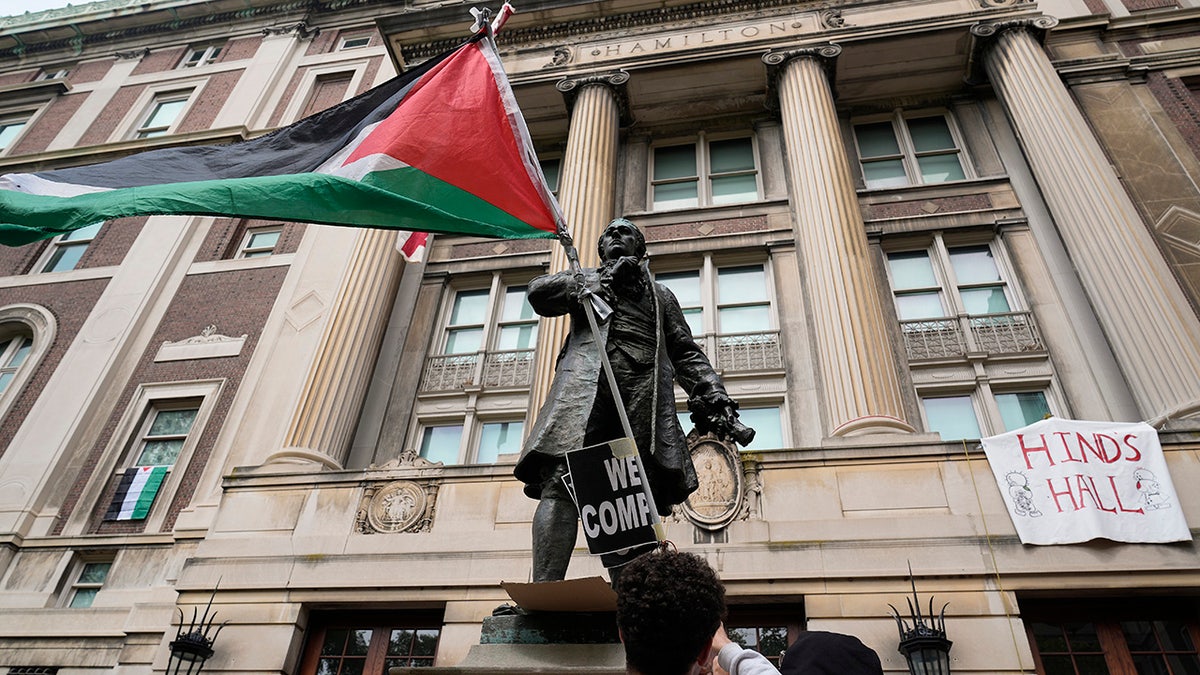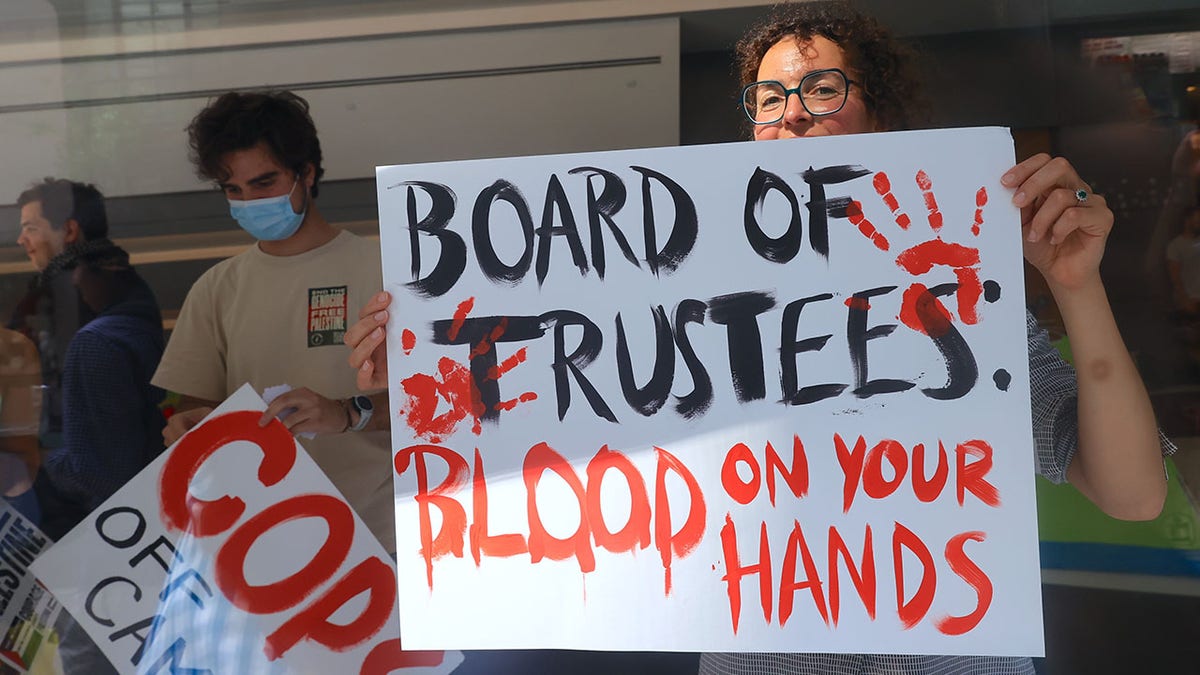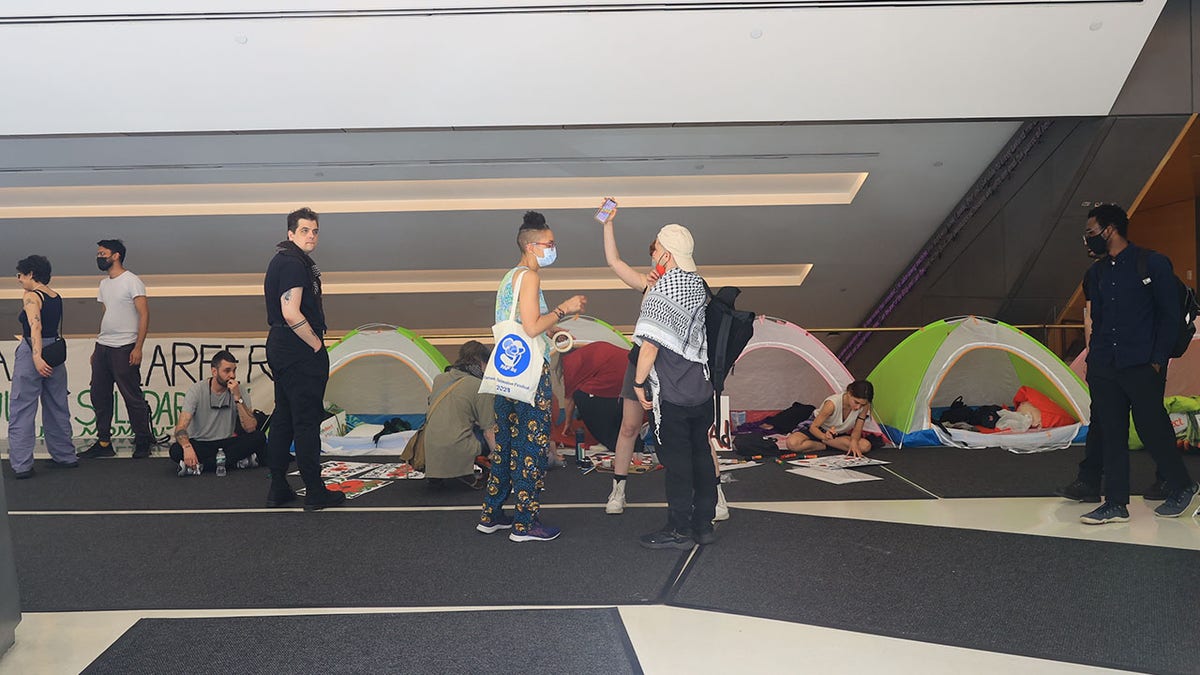Northeast
Columbia president calls last 2 weeks ‘among the most difficult’ in school's history amid anti-Israel protests

Columbia University’s embattled President Minouche Shafik on Friday called the last two weeks “among the most difficult in Columbia’s history,” as anti-Israel protests continue to rage on the New York City campus.
Shafik, speaking publicly for the first time about the long-running demonstrations that have taken over the campus since police cleared an occupied campus building in a video message posted to the university’s social media, said the “turmoil, tension, division and disruption have impacted the entire community.”
She noted that the students have “paid an especially high price” by losing out on the final days of the year in classrooms and residence halls — “For those of you who are seniors, you’re finishing college the same way you started: online.”
She continued, “No matter where you stand on any issue, Columbia should be a community that feels welcoming and safe for everyone.”
REP ELISE STEFANIK URGES TRUSTEES TO REMOVE COLUMBIA’S SHAFIK AFTER MOB SEIZES BUILDING
Columbia University president Minouche Shafik spoke about the “difficult” last two weeks in a video speech on Thursday. (Fox News Digital)
Shafik’s speech came days after police raided the university’s Hamilton Hall administration building after it was illegally occupied by protesters.
“We tried very hard to resolve the issue of the encampment through dialogue,” she said. “Many of the people who gathered there were largely peaceful and cared deeply about the humanitarian crisis in Gaza.”
The president said that the university made a “sincere and good offer, but it was not accepted,” along with academic leaders talking with the protesters for eight days and nights.
UNC FRATERNITY BROTHERS DEFEND REINSTATED AMERICAN FLAG FROM CAMPUS MOB WHO REPLACED WITH PALESTINIAN FLAG
She said that a group of protesters “crossed a new line” with the occupation of Hamilton Hall last that was a “violent act that put our students at risk as well as putting the protesters at risk.”
Seeing the damage the rioters caused as she walked through the building that holds classics, Germanic and Slavic language classes, was “distressing,” she said.
“But, despite all that has happened, I have confidence. During the listening sessions I held with many students in recent months, I’ve been heartened by your intelligence, thoughtfulness and kindness.”
She said she was most impressed by those were able to acknowledge those opposing them had “some valid points. We need more of that at Columbia,” noting that “parallel realities and parallel conversations have walled us off from other perspectives.”

An anti-Israel protester holds a Palestinian flag outside the entrance to Hamilton Hall on the campus of Columbia University, April 30, in New York City. (AP Photo/Mary Altaffer/Pool)
Shafik was born in Egypt and grew up in a Muslim family, noting in her address Friday that she had “many Jewish and Christian friends” growing up. “I spent two decades working with international organizations with people from every nationality and religion in the world, where if you can’t bridge divides and see the other side’s point of view, you can’t get anything done.”
The Israeli-Palestinian conflict, antisemitism and Islamophobia have all existed for a long time,” she noted, adding that Columbia “cannot solve them single-handedly.”
But she said Columbia could be an example to the world of civil discourse and having “empathy and compassion for one another.”
“We have a lot to do, but I am committed to working at it every day and with each of you to rebuild community on our campus,” she closed.
Shafik has faced calls to resign and on Thursday, a Columbia faculty group called for a vote of no confidence against Shafik.
Fox News Digital’s Louis Casiano contributed to this report.
Read the full article from Here

Northeast
New School anti-Israel protesters, faculty occupy campus building in NYC: report

Anti-Israel protesters and faculty at The New School in New York reportedly are occupying one of the institution’s buildings in an attempt to get its board of trustees to vote on divesting from companies supporting the Jewish State.
The occupation of the Welcome Center in Manhattan comes as two anti-Israel encampments have been ongoing at The New School – one led by students, and the other by faculty.
A report by The New School Free Press student newspaper said the occupiers were letting people out of the building on Tuesday night but not letting anyone inside.
The New School did not immediately respond Wednesday to a request for comment from Fox News Digital.
COLUMBIA PRESIDENT ‘SORRY’ FOR CANCELED COMMENCEMENT DURING ANTI-ISRAEL PROTESTS, NOW FACES ‘HARD QUESTIONS’
Anti-Israel protesters are seen at The New School in New York City on May 8. (Selcuk Acar/Anadolu via Getty Images)
Those occupying the Welcome Center – which is the first stop on campus tours and houses multiple offices, including admissions – have renamed the building the “Lama Jamous Center” in reference to a 9-year-old Palestinian girl who has been reporting on the war in Gaza, according to The New School Free Press.
They want the private university to divest from companies that are backing Israel and are now hanging a Palestinian flag from the upper levels of the Welcome Center, it added.
JUSTICE ALITO WARNS COLLEGE STUDENTS THAT ‘SUPPORT FOR FREEDOM OF SPEECH IS DECLINING’

Anti-Israel protesters are seen at The New School in New York City on May 8. They have now occupied a building there, reports say. (Selcuk Acar/Anadolu via Getty Images)
The continued anti-Israel protests at The New School come as it is preparing to host its commencement ceremonies this Friday.
Graduation events at other colleges in Manhattan, such as Columbia University, have been frequently disrupted by anti-Israel protesters.
Earlier this month, the New York Police Department was called to break up anti-Israel protests at The New School and New York University.

An anti-Israel encampment at The New School in New York. (Selcuk Acar/Anadolu via Getty Images)
After the operations, NYPD Chief of Patrol John Chell told reporters that police took the actions “at the request of school presidents” and ultimately arrested 56 people, with no incidents.
Fox News’ CB Cotton and Lawrence Richard contributed to this report.
Read the full article from Here
Boston, MA
MacKinnon: Poor kid from the projects in Toledo makes a positive impact in Boston

Like Boston and a number of other cities, Toledo, Ohio, has its tougher and more challenging neighborhoods. Tom Seeman grew up in a family of fourteen in a predominantly black housing project in one of those neighborhoods.
Like so many, Seeman was consigned to a childhood of poverty, dysfunction, and constant turmoil by birth. The price he paid for being brought into this world was high at times. There were constant challenges and emotional and physical pain both inside his rundown home in the projects as well as waiting for him the minute he crossed the threshold of that home onto the tough and turbulent streets.
But, unlike so many in those neighborhoods and on those streets, Seeman had an inner vision, the intellectual gifts, and the determination to propel himself out of that project, away from the neighborhood, and into a world of success many dream of but few achieve. A world of earned success which landed him at Yale University; Harvard Law School; McKinsey & Company; and finally corporate boardrooms as a CEO.
But to get to such lofty platforms from the lowest of the lows, one usually needs an epiphany which clears and decompresses the mind just long enough to see an invaluable truth which had always been right before you. For Seeman, that moment came in the fourth grade.
It was there and then that Seeman made a shocking — but liberating — announcement. When his teacher asked his class to name the greatest thing each of their parents had given them, he stood and said: “The greatest thing my mother has given me is that she’s always there to help me. And the greatest thing my father has given me is an example of what I don’t want to be.”
Simply by vocalizing what had long been locked inside his mind, a tremendous weight had been lifted from Seeman’s shoulders. Replaced by a lightness in mind and spirit that allowed him to focus on escaping the life he was born into.
In a number of ways, Seeman’s escape was the Boston areas gain.
After achieving his goals for success as an adult, Seeman made an inspiring pledge to himself: “Every day, do something kind for a stranger.” He has fulfilled that pledge and then some.
“Every act of kindness, no matter how small, makes a difference,” said Seeman. “Some days it’s something small, like letting someone into my lane in traffic, and some days it’s something sizable, like creating a scholarship for underserved kids… Most days, my promise falls somewhere in between.”
One of those “sizable” acts of kindness saw Seeman and his wife Jenny donate one million dollars to the St. Francis de Sales School in Toledo, Ohio for the benefit of economically disadvantaged children. A school Seeman credits with helping to land him firmly on the path to success, when, as himself an impoverished eighth grader, the school administrator offered him a near full scholarship.
Years after his escape from that tough Toledo neighborhood, Seeman settled in the greater Boston area with his wife Jenny to raise a family. After doing so, his passion to give back only grew. Today – among other things — Seeman currently serves on the Board of Directors of the Boys and Girls Clubs of Boston and on the Board of Trustees of the Museum of Fine Arts.
Years before coming to Massachusetts and while still at Yale, people began asking Seeman the same question: “How did you get out?” It is a critically important question.
Statistics about such poor, tough and dysfunctional neighborhoods indicate that it is almost a certainty that one would not “get out.” That one would not choose wisely. That one would fall into a pattern of hooking school, substance abuse and crime.
Later in his life as more and more people learned of his “rags to riches” story, many suggested to Seeman that he tell his inspiring story via a book. While honored and humbled by the encouragement, Seeman was quite hesitant to do so. First, because to do so would entail ripping off scabs, reliving pain, and quite possibly hurting or embarrassing family members. And second, because the process can be overwhelming.
For those reasons and more, Seeman rejected the idea of a memoir detailing his challenging childhood. But then those around him offered up the most important reason of all: “What if your story could not only reach someone going through what you endured — or much worse — but change a life for the better?”
That reasoning made great sense to Seeman. It was yet another way to fulfill the pledge to himself: “Every day, do something kind for a stranger.” Seeman came to believe that he could tell his story to further help the charities he so deeply cared about.
So Seeman sat down and wrote that story, titled “Animals I Want to See: A Memoir of Growing Up in the Projects and Defying the Odds.” A book that is deeply moving, will inspire all who read it, and will create untold acts of kindness.
Douglas MacKinnon – originally from Dorchester — is a former White House and Pentagon official and an author.
Pittsburg, PA
New hope for moms with postpartum depression

PITTSBURGH (KDKA) – The first FDA-approved pill to treat postpartum depression was approved a few months ago, and it’s already helping moms in the Pittsburgh area.
About one in eight women who have given birth experience symptoms of postpartum depression.
An Allegheny Health Network doctor told KDKA-TV that the medication allows them to receive treatment at home with their baby and family by their side.
If you’re feeling sad, hopeless, or overwhelmed after giving birth, you don’t have to tackle it by yourself.
“If you are at all feeling distressed or this is feeling hard, that’s okay there are resources to help,” said Dr. Ewurama Sackey, medical director at AHN Women’s Behavioral Health.
She said the first pill for postpartum depression, Zurzuvae (Zuranolone), is giving moms new hope. The medication is taken at nighttime for 14 days. About 10 or 15 of her patients have taken it so far.
“One patient told me she feels more like herself, so she feels more like herself than she had even during her pregnancy, so she feels back to herself prior to pregnancy,” Dr. Sackey said.
Before this medication, women could take anti-depressants, which take longer to work, or get the similar neuro-steroid, Brexanolone, which requires an IV injection and a stay in the hospital for a few days.
“You can’t be at home or your family or your baby, and so this medication is much different in that you can have the supports at home, you can continue to foster attachment with your family, with your baby,” Dr. Sackey said.
Dr. Sackey said Zurzuvae’s side effects can include feeling tired, dizzy, or lightheaded and if severe, the dose can be decreased.
She’s seen the benefits of using it for both mild/moderate and more severe PPD.
She said fast-acting prescription drug helps improve mood during a critical time when hormones are fluctuating.
“We want to help people get better as soon as possible. We know that after giving birth, people are at the highest risk versus anywhere in their reproductive lives for the risk of suicide,” Dr. Sackey said.
PPD symptoms can be similar to depression like low mood and isolation.
“But also, things related to your baby like thinking, ‘I’m not a good mom or parent, this baby doesn’t like me, I’m not good enough, I will never be good enough, this isn’t for me,’” Dr. Sackey said.
Dr. Sackey said that it’s critically important to talk to your doctors about what can best help you.
If it’s taking this medication, the real work happens after that.
“Medication alone is not going to cure or help all of PPD. It’s really important that people engage in therapy, and that does take a longer amount of time,” she said. “This is for the family, this is for their future and so we’re here for you, we support you and we care about you,” she added.
-

 World1 week ago
World1 week agoPentagon chief confirms US pause on weapons shipment to Israel
-

 Politics1 week ago
Politics1 week agoRFK Jr said a worm ate part of his brain and died in his head
-

 Politics1 week ago
Politics1 week agoOhio AG defends letter warning 'woke' masked anti-Israel protesters they face prison time: 'We have a society'
-

 News1 week ago
News1 week agoNine Things We Learned From TikTok’s Lawsuit Against The US Government
-

 Politics1 week ago
Politics1 week agoBiden’s decision to pull Israel weapons shipment kept quiet until after Holocaust remembrance address: report
-

 Education1 week ago
Education1 week agoVideo: Police Use Pepper Spray on Protesters on G.W.U.’s Campus
-

 World1 week ago
World1 week agoA look at Chinese investment within Hungary
-

 News1 week ago
News1 week agoThe Major Supreme Court Cases of 2024





:quality(70)/cloudfront-eu-central-1.images.arcpublishing.com/dlnews/J3B5VUB4AJBETGDNWVTTBSEACE.jpg)









